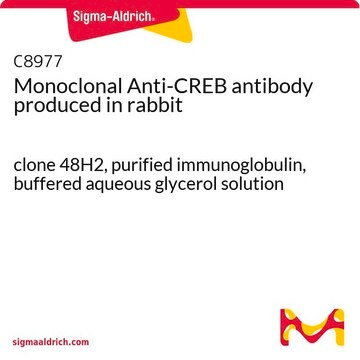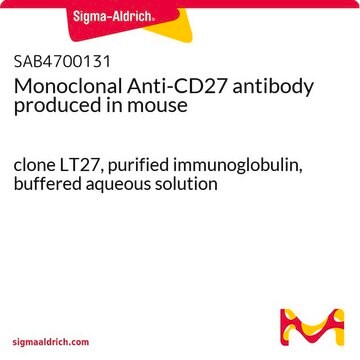C8974
Anti-CD27 antibody produced in goat
affinity isolated antibody, lyophilized powder
Sign Into View Organizational & Contract Pricing
All Photos(1)
About This Item
Recommended Products
biological source
goat
Quality Level
conjugate
unconjugated
antibody form
affinity isolated antibody
antibody product type
primary antibodies
clone
polyclonal
form
lyophilized powder
species reactivity
human
technique(s)
flow cytometry: suitable
neutralization: 2.25-9.0 μg/mL
western blot: 0.1-0.2 μg/mL
UniProt accession no.
storage temp.
−20°C
target post-translational modification
unmodified
Gene Information
human ... CD27(939)
General description
CD27, a member of tumour necrosis factor receptor superfamily is mainly responsible for regulation of cell proliferation and cell death. CD27 and its ligand CD70 expresses mainly on lymphocytes. Anti-CD27 antibody can be used in immunoblotting and flow cytometry. It can also be used in immunopresipitating CD27. Anti-CD27 antibody reacts specifically with human CD27 and not with recombinant human CD30, recombinant human NGF R, recombinant human soluble TNF RI, or recombinant human soluble TNF RII.
Immunogen
recombinant human CD27 extracellular domain expressed in Sf2I insect cells.
Application
Anti-CD27 antibody can be used in neutralization, immunoblotting and indirect flow cytometry assays.
Physical form
Lyophilized from 0.2 μm filtered solution of phosphate buffered saline with 5% trehalose.
Disclaimer
Unless otherwise stated in our catalog or other company documentation accompanying the product(s), our products are intended for research use only and are not to be used for any other purpose, which includes but is not limited to, unauthorized commercial uses, in vitro diagnostic uses, ex vivo or in vivo therapeutic uses or any type of consumption or application to humans or animals.
Not finding the right product?
Try our Product Selector Tool.
Choose from one of the most recent versions:
Already Own This Product?
Find documentation for the products that you have recently purchased in the Document Library.
K V Prasad et al.
Proceedings of the National Academy of Sciences of the United States of America, 94(12), 6346-6351 (1997-06-10)
Members of the tumor necrosis factor receptor (TNFR) superfamily are important for cell growth and survival. In addition to providing costimulatory signals for cell proliferation, ligation of both TNFR1 and Fas can result in programmed cell death or apoptosis. The
Our team of scientists has experience in all areas of research including Life Science, Material Science, Chemical Synthesis, Chromatography, Analytical and many others.
Contact Technical Service







